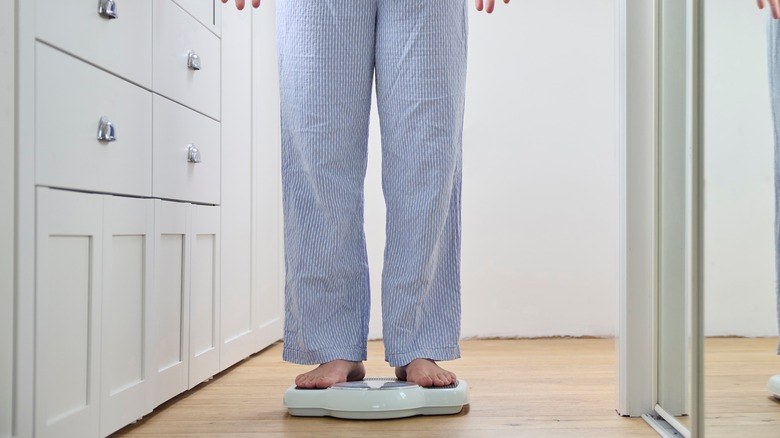False Facts About Sex You Always Thought Were True
Almost from the start, sex is something that is shrouded in mystery and rumors. As we get older and more educated, some of those mysteries are resolved, but that doesn't mean that others don't rise up in their place. A 2009 study published in Female Patient showed that more than a quarter of emails sent to Princeton University's Emergency Contraception Website showed misunderstandings or misconceptions about sex.
Although sex education is still taught in schools, the Centers for Disease Control and Prevention report that, on average, high school students receive approximately 6.2 hours of study on sex-related topics. In addition, there are less than four hours spent on preventing pregnancy and disease. Because of this, many adults continue to remain ignorant about some of the basics when it comes to sex. A survey conducted by the Family Planning Association showed that almost 90% of people questioned did not know that sperm can live inside a woman's body for up to seven days, Reuters says. They also believed that such startling rumors as jumping up and down after sex could prevent pregnancy. There are many sexual myths and urban legends making the rounds, and buying into them can make your time in the bedroom less enjoyable than it should be.
Sex will help you lose weight
According to a 2013 study published in PLOS ONE, men can burn more than 100 calories during a 30-minute sex session, while women can burn close to 70. This means that a healthy round of sex with your partner most definitely falls under the category of moderate to heavy exercise. The problem there is that, per a 2005 study in the Journal of Sexual Medicine, while an overall sexual encounter could last 30 minutes or more, the average length of calorie-burning vaginal intercourse clocked in at anywhere from three to seven minutes.
However, that's not to say that sex can't be a good way to get some cardio into your exercise routine. Sex can raise your heart rate and blood pressure, and can also release oxytocin, a hormone that can reportedly reduce stress and may also keep food cravings at bay. A 2017 article published in Nature Reviews Endocrinology showed a link between oxytocin production and lowered calorie consumption. So, while sex may not be the miracle weight-loss cure you were hoping for, there are still worse ways to work out.
You can't get pregnant on your period
While the American Pregnancy Association does note that the risk of getting pregnant during menstruation is low, that doesn't mean it's impossible. Depending on where you are in your menstrual cycle, you could still get pregnant if you have sex towards the end of your period. This is because sperm can continue to live for up to five days inside your body.
It can be hard to keep track of your periods, as well as the length of your cycle, as everyone is different, according to Planned Parenthood. Because of this, the best way to ensure that you don't get pregnant while on your period is to use birth control, such as condoms or the pill. Keep in mind that, as the National Health Service notes, certain contraceptive methods can lead to irregular periods or stop them altogether. If your periods are irregular while taking birth control pills, it's a good idea to speak with your doctor to see if it is still the most effective and safe method for you.
All women orgasm during vaginal sex
It doesn't matter how good the sex is; the fact remains that it is difficult for a woman to achieve orgasm through vaginal penetration alone. A 2018 study published in the Journal of Sex and Marital Therapy showed that 36.6% of women said that clitoral stimulation was required for an orgasm. An additional 36% said that, while stimulation of the clitoris was not necessary, it did improve their orgasms overall. Only 18% of women reported being able to reach climax solely through vaginal intercourse.
The secret to a woman being able to have an orgasm without direct stimulation of the clitoris may come down to the "rule of thumb," as reported by the West Coast Centre for Sex Therapy. According to the rule, women who have less than the distance from the tip of their thumb to the knuckle between their clitoris and the opening of their vagina are more likely to orgasm from vaginal sex. If you or your partner aren't able to orgasm without clitoral stimulation, don't blame yourself. It may just be your anatomy.
You can't get pregnant from pulling out
Withdrawing the penis from the vagina right before ejaculation may seem like a foolproof way to avoid pregnancy. And according to a 2014 study in Contraception, when executed properly, pulling out had a failure rate of just four percent, meaning that 96% of the time, sexual intercourse that ended in withdrawal did not result in pregnancy. However, it's the proper execution that can be the problem, according to the Mayo Clinic. You have to time your withdrawal just right and ensure that ejaculation doesn't happen anywhere near the vagina. In addition, before you decide to have sex again, you will need to urinate and clean off any remnants of semen from your penis.
In addition, before you even ejaculate, you run the risk of getting your partner pregnant. The Cleveland Clinic points out that pre-ejaculate fluid that is generated before ejaculation may contain a small amount of sperm. While it is not as much sperm as is released during actual ejaculation, there is still the risk of pregnancy. According to a 2011 study published in Human Fertility, 41% of the subjects tested had sperm present in their pre-ejaculate fluid, and of those, 36% had sperm that was motile.
Oral and anal sex are safe alternatives to vaginal sex
The term "safe sex" can be used somewhat loosely. Yes, deciding to practice oral or anal sex can be a good alternative for couples who are looking to be intimate and avoid pregnancy. However, that doesn't mean that either option is completely safe. According to Better Health, both oral and anal sex can still carry the risk of transmitting infections and disease. Oral sex can transmit such viruses as the human papillomavirus (HPV), herpes, and gonorrhea. As such, couples should avoid having oral sex if one partner has a sexually transmitted disease or any sores, cuts, or blisters around the mouth, genitals, or anus.
Similar to oral sex, anal sex is also not a risk-free activity. For starters, as noted by Medical News Today, the anal area does not have any natural lubrication, which can lead to tears as a result of friction. These tears can leave the body open to bacterial infection. In addition, for people who are worried about pregnancy, there is still a slight risk, as semen could still enter the vagina if it leaks out from the rectum (via Planned Parenthood). So, while anal and oral sex are alternatives to vaginal sex, it's best to know all the risks before adding them to your bedroom repertoire.
Oysters are a natural aphrodisiac
It's long been an urban legend that eating oysters is one way for couples to ramp up their sex drives. However, according to Nutritious Life, the science is out on whether or not these shellfish are a true libido enhancer. The biggest argument in favor of oysters' potency is their high levels of zinc. The National Institutes of Health reports that oysters are higher in zinc than any other food. Zinc plays a major role in sexual function and fertility for men, and according to a 2018 study published by the Journal of Reproduction & Infertility, low zinc levels can affect testosterone and the quality of sperm.
In addition to zinc, oysters are rich in a number of other nutrients that could have an impact on the libido (via Medical News Today). These include D-aspartic acid, which could factor into the production of testosterone, and omega-3 fatty acids, which could help improve one's performance in the bedroom. A 2016 study in the Journal of Korean Medical Science showed that omega-3 fatty acids improved penile blood flow and reduced the effects of erectile dysfunction. However, despite the obvious health benefits of oyster consumption, Clean Eating points out that the hormone boost that comes from oysters is minimal and not quite enough to label it a true aphrodisiac.
You can spot someone with an STD
A common myth is the idea that, just by looking at someone, you can tell whether or not they have a sexually transmitted disease (STD). However, the Centers for Disease Control and Prevention point out that many STDs don't present with outward symptoms, and many don't even have symptoms at all. With that in mind, the only way to know if you or your sexual partner has a sexually transmitted disease is to get tested.
Although STDs can be tough to diagnose without the help of a medical professional, there are some warning signs you can be on the lookout for, according to the Mayo Clinic. These include pain or burning while urinating, discharge from either the penis or the vagina, or sores or bumps in the genital or rectal area. Again, these are not necessarily symptoms that can be spotted simply by looking at someone. Therefore, it's important that you and your partner be upfront and honest with each other about any symptoms you may be experiencing or any test results you may have received.
The bigger the penis, the better the sexual experience
It's not a secret that men are very often preoccupied with penis size, as well as the insecurities related to it. In fact, according to a 2015 study published in PLOS ONE, nearly 70% of men were concerned about the size of their penis. However, it may put some men at east to know that a 2019 study conducted by Clue revealed that the majority of women placed an attractive smile over a large penis when it came to desirable attributes in a partner. Additionally, the majority of women polled also said they preferred an average-sized penis to a larger one.
In addition, the idea that a larger penis will make for better sex is largely incorrect and, according to Sharecare, it could actually be detrimental to your sex life in some cases. In heterosexual relationships, a large penis can cause a number of problems for the female partner, including gagging during oral sex, tearing of the vaginal tissue, and even the possibility of a urinary tract infection if the penis rubs against the urethra.
Having sex while pregnant will cause you to go into labor
For pregnant couples who are at the end of their term, the idea of doing something, anything, to get things moving can be very attractive. According to Healthline, there are a few things that are rumored to cause labor to start. Among these are spicy foods, exercise, and, yes, sex. However, a 2019 study published in the Journal of Sexual Medicine showed that sex did not increase the likelihood of labor in any significant way.
On the flip side, there are some studies that have shown the possibility that, while it may not actually spark labor, third-trimester sex is at least worth a try. A 2006 study published in Obstetrics and Gynecology showed that women who were sexually active at term had a tendency to deliver sooner than women who were not. It's also possible that nipple stimulation, genital stimulation, and orgasm could all play a role in moving labor along because of the release of oxytocin (via What to Expect). All told, there's no guarantee that sex will start labor, but you and your partner are free to enjoy yourselves regardless.









